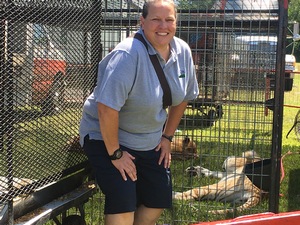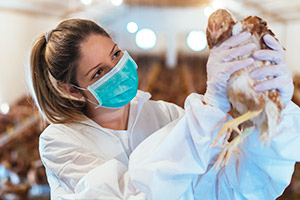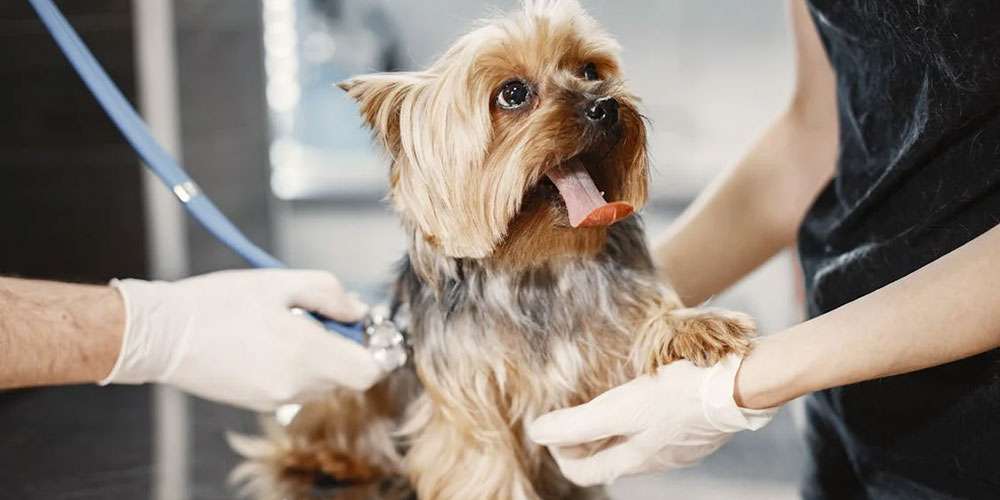You have always envisioned a future in veterinary medicine for yourself. You’ve often thought about operating a brick-and-mortar clinic that serves dogs and cats, but you’re also starting to realize there are a lot more opportunities out there. Doctors of Veterinary Medicine (DVMs) are serving their communities in a wide variety of roles.
While plenty of St. George’s University School of Veterinary Medicine graduates have chosen to practice in small animal clinics, there are many who’ve opted for vastly different career paths.
Learn how these grads have built satisfying veterinary careers.
5 SGU vet school grads making a difference outside traditional clinical practice
You might be surprised at just how varied these SGU alumni’s roles are. Perhaps you’ll even find some inspiration for your future after vet school.
1. Revolutionizing how pet care is delivered
A typical trip to the vet can be stressful for both pet owners and their beloved animals. Dr. Kim Springman, DVM ’10, an SGU graduate and owner of Hometown Veterinary Clinic, is beginning to change that with her mobile operation.
“It’s the future of veterinary medicine,” she says. “People don’t want to leave their homes. With the advent of online ordering, grocery delivery, and restaurant curbside pickup, people want a more personalized, convenient service.”
Mobile vet clinics are “the future of veterinary medicine.” – Dr. Kim Springman
So far, evidence suggests Dr. Springman is right. Her mobile operation saw substantial growth without any advertising. “The business grew exponentially simply by word of mouth,” Dr. Springman reflects. Furthermore, a local newspaper awarded Hometown Veterinary Clinic as her community’s pick for best veterinary clinic in 2018.
Like many other vets, Dr. Springman started out in a brick-and-mortar setting. She realized she wasn’t happy in that traditional environment, and decided to tag along with a house-call vet she knew.
“I instantly knew it was where I’m meant to be,” she says. “I’m much more appreciated in my current role. I now own a very successful house-call business.”
The entire operation consists of a truck that can be used either as a facility or simply to transport all the materials she needs for house visits as well as a building for surgeries and radiographs. This goes to show that mobile vets can do much more than just administer vaccines and solve simple problems. Sometimes house-call veterinarians actually see more complex cases, particularly if a pet owner has put off going to a physical clinic for fear of being ridiculed.
A solid education is important for every veterinarian, which is why it’s so important to pick the right program. Dr. Springman decided to take advantage of the See SGU Program to make sure the school was right for her. She says she knew it was a good fit before even stepping foot off the plane. And she couldn’t be happier with her choice.
“The education I received at SGU far surpassed one I would have gotten if I attended a US school.” -Dr. Kim Springman<
“The education I received at SGU far surpassed one I would have gotten if I attended a US school,” Dr. Springman says.
2. Improving medical treatment for exotic animals
SGU veterinary grad: “I’m making a difference”
Not every future vet wants to treat dogs and cats—some choose to focus on something a little out of the ordinary. SGU grad Dr. Kendra Baker, veterinary fellow at the National Aquarium and former international veterinary intern at the Philadelphia Zoo, is certainly one of those people given she’s focused so much of her time on rehabilitation and release of orangutans and slow lorises.
 She completed the first portion of her zoo internship in Philadelphia, then she relocated to Borneo to do similar work with a rehabilitation sanctuary called Yayasan International Animal Rescue Indonesia. Dr. Baker’s goal was to find some common ground between the two very different settings.
She completed the first portion of her zoo internship in Philadelphia, then she relocated to Borneo to do similar work with a rehabilitation sanctuary called Yayasan International Animal Rescue Indonesia. Dr. Baker’s goal was to find some common ground between the two very different settings.
“I hope this program can help facilitate the exchange of information between zoo medicine and conservation medicine in order to expand our overall knowledge base,” she says of her internship experience.
One of the reasons exotic animal medicine is so thrilling is that there’s a fair amount of unknown. Zoo vets often have to come up with solutions on the fly, and they may work with any number of incredibly different species. Veterinarians have to draw from their well of knowledge to provide quality care.
“This often means extrapolating from known species, like domestic animals and humans,” Dr. Baker explains. She adds that using known quantities as a base can help veterinarians come up with appropriate medication doses for exotic animals.
While Dr. Baker has clearly taken many steps to pursue a unique path, it all started with vet school. Attending SGU afforded her a lot of opportunities that she credits with her success.
“I’m thankful for the family I made while attending SGU,” she says. “I definitely wouldn’t be where I am today without them.”
3. Supporting human and animal welfare
 Some individuals choose their careers based on a desire to make a difference. SGU alumni Dr. Autumn Unck would definitely fall into this category. As a Veterinary Medical Officer with the Animal Care unit of the US Department of Agriculture’s (USDA’s) Animal and Plant Health Inspection Service, she has a wide range of responsibilities that affects both humans and animals.
Some individuals choose their careers based on a desire to make a difference. SGU alumni Dr. Autumn Unck would definitely fall into this category. As a Veterinary Medical Officer with the Animal Care unit of the US Department of Agriculture’s (USDA’s) Animal and Plant Health Inspection Service, she has a wide range of responsibilities that affects both humans and animals.
“I’m a field veterinarian who ensures the health and welfare of species and activities regulated by the Animal Welfare Act.” – Dr. Autumn Unck, DVM ’15
“I’m a field veterinarian who ensures the health and welfare of species and activities regulated by the Animal Welfare Act,” Dr. Unck explains. But that’s hardly the extent of her duties. “My other responsibilities are to respond to emergencies in the United States when called upon, which includes helping with natural disasters as well as animal and public health outbreaks,” she adds.
Though Dr. Unck ultimately ended up in a career she enjoys, her path there was a bit winding. She transferred to St. George’s University after initially starting her veterinary education at a different school. It proved to be a positive move. Dr. Unck fondly recalls her interactions with SGU instructors.
“They truly care about the students and want to teach,” she emphasizes. “You aren’t just a number.”
While some students are hesitant about attending a Caribbean veterinary school, Dr. Unck was unafraid. She actually thinks there are some advantages to leaving the US, because you gain exposure to different experiences. Despite Grenada’s small size, she had the chance to work with a variety of animals and farmers. The result?
“I received the education I was looking for,” Dr. Unck says. “And it has allowed me to pursue a career that I love.”
4. Leading by example
 SGU alumni Dr. Ross Massimiano began vet school with his sights set on pursuing a career as a small animal veterinarian. Now, an Area Medical Director for Southern California at THRIVE Affordable Vet Care, he clearly had a change of heart.
SGU alumni Dr. Ross Massimiano began vet school with his sights set on pursuing a career as a small animal veterinarian. Now, an Area Medical Director for Southern California at THRIVE Affordable Vet Care, he clearly had a change of heart.
“I just don’t think it’s exactly what I was meant to do,” Dr. Massimiano says.
Though he still works with patients, Dr. Massimiano now oversees three clinics and does a fair amount of remote work. Educating other DVMs is also a big part of his job. Progressing into this role was actually a natural move for Dr. Massimiano. He has a background in both science and education, which makes him well suited to help lead other veterinarians. It’s just an added perk that he enjoys it so much.
“Being able to educate new vets is fun,” he says. “It’s always cool to see what other people get excited about.”
Promotion happened quickly for Dr. Massimiano, so he was clearly ready to hit the ground running. That likely had to do with his clinical training in wildlife and zoo medicine in Australia as well as his time in Grenada at SGU. He was surprised how much the program emphasized hands-on learning right away.
“I’d always heard vet school was more about reading books for a few years, then they toss you into clinics where you get your hands dirty,” he says. “I feel like SGU got us in the clinic really fast, and that was definitely helpful.” He also mentions he thoroughly enjoyed taking advantage of all the great things to do in Grenada.
If he had to give future vet students one piece of advice, Dr. Massimiano says he would advise them to keep an open mind. It’s what prompted him to obtain his DVM at SGU and also led him to his current position.
“You may be surprised at what you really end up enjoying.” – Dr. Ross Massimiano
“Just go in with an open mind, willing to learn anything,” he suggests. “You may be surprised at what you really end up enjoying.”
5. Championing animal nutrition standards
For further proof that it’s a good idea to be open-minded about your eventual career, look no further than SGU graduate Dr. Amy McClure-Ottmers. She never dreamed she would one day become a Veterinary Territory Manager for Hill’s Pet Nutrition, working to help clinics and pet specialty stores grow their businesses through nutrition. But she’s glad things worked out the way they did.
“It is not something I ever saw myself doing when I started vet school, but I absolutely love my job and all the amazing clinics I get to work with every day,” Dr. McClure-Ottmers says.
In a typical day, Dr. McClure-Ottmers visits five to seven clinics. She travels to different cities and gets to meet new veterinarians on a regular basis. While this role might seem like a drastic shift from working in a practice, it’s actually a natural fit. Dr. McClure-Ottmers says she’s constantly drawing upon her veterinary medicine knowledge.
“I have learned so much more about clinical veterinary medicine now than I ever did in traditional practice,” she offers.
“I have learned so much more about clinical veterinary medicine now than I ever did in traditional practice.”

Of course, Dr. McClure-Ottmers began her career journey by completing a DVM program. She first learned about SGU at a conference. Though she acknowledges leaving the country was a little out of her comfort zone, she felt like it was the right move after doing plenty of research. Plus, her initial feeling about the school was hard to shake.
“I knew right away that it was the school for me, “Dr. McClure-Ottmers enthuses. “And, well, the rest is history!”
Start crafting your career
You can see there’s a whole host of career options for hard-working veterinarians. A DVM is a versatile degree that can help you shape a satisfying career. And the stories highlighted above are just a sampling of the varying roles SGU vet school grads have pursued. There are many more inspiring stories where these came from.
If you’re curious about how SGU could fit into your future, take your research a step further. Learn even more about the program by visiting our request information page.
**This article has been updated with new information as of September 9, 2020.

